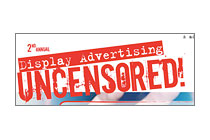 At New York City’s Time Warner Center last Thursday, Collective sponsored its 2nd annual “Display Advertising Uncensored” event, which brought together a broad cross-section of display advertising players to discuss the growing momentum (and confusion!) in the display ad space.
At New York City’s Time Warner Center last Thursday, Collective sponsored its 2nd annual “Display Advertising Uncensored” event, which brought together a broad cross-section of display advertising players to discuss the growing momentum (and confusion!) in the display ad space.
The panel was moderated by Randy Cohen of Advertiser Perceptions and included Lexi Reese of Google’s DoubleClick Ad Exchange, Nat Turner of Invite Media, Joe Apprendi of Collective, Steven Kaufman of Mediacom, Bob Carrigan of IDG and Justin Evans of Nielsen.
Among the topics discussed, the momentum in the space for the “demand-side platform” (DSP) model was noted as well as the challenges facing the supply side. Collective’s CEO Apprendi identified the noise around the oft-mentioned DSP acronym and added that his company has had a demand-side platform all along given the definitions floating around these days.
Demand-side platform Invite Media’s CEO Nat Turner chimed in on the supply-side issue and how ad networks and his company are solving the issue which addresses channel conflict issues for publishers and needed transparency for buyers:
(from the event…)
“When you look at publishers, and for a small publisher, they can’t really support a sales team. They don’t really have the attention of the agencies and that’s why they work with ad networks, which build up the aggregation of these (smaller) publishers.
…The exchanges – I think the thing that needs to happen is being able to set controls around [the inventory]. So the publisher doesn’t have to say it’s Time.com/news, the publisher can say it’s a ‘premium news site’ and to the buyer, it’s totally fine to say it’s one of these 20 sites. ‘But, we’re not going to tell you which site on a specific impression but that it’s one of 20.’ And for us, when we tell that to publishers, that gets them over the hump. And for agencies, that gets them over a threshold of brand safety.”
Later, Turner looked at the buy-side and the need for better attribution – or understanding of ROI across the digital marketing mix.
“Most of our challenges revolve around how you value the buying you’re doing across exchanges. We always like to say that an algorithm is worthless if you’re optimizing toward something that the buyer doesn’t care about. That happens all the time – their conversion isn’t really a true conversion at the end of the day. We spend a lot of time trying to help close the loop in terms of performance.
Our buyers are very different. They are not trying to buy the [home page] takeovers from the publishers. They actually want to get mass reach on very commoditized banners. The challenge is how do you measure that. A funny story I heard recently was a marketer at an agency called us and said, ‘We have to work with you. We have to turn display back on.’ And, three months ago, the agency had said, ‘We’re doing no display for the next three months.’ Well, the advertiser called and said that their search performance had gone down 40%.”
It would seem a matter of time before venture capital firms and startups start targeting “attribution” even more heavily given the big pay day potential and its impact across the ad ecosystem. A few startups are in the space right now such as Convertro and ClearSaleing. Comscore, Nielsen, Adobe/Omniture are there with panels and data. Some agencies will tell you there doing it themselves.. but still you get anecdotes such as Turner’s – a continuing tale of cross-channel attribution woes.
Pass the VC hat. This needs to be solved and will unlock audience buying for all data-driven digital channels which can loop in the traditional channels through aggregation of still more data – offline.
By John Ebbert










